- Home
- Joy Dettman
Jacaranda Blue Page 8
Jacaranda Blue Read online
Page 8
‘As indeed it has. As indeed it has,’ he muttered.
According to Patrick, things had altered considerably in six months, and for the better. Harold Smithton, a pernicious little pustule, had passed on, and a second member, Matthews, a know-all ferret of a man, with whom Martin had no patience at all, had been struck down by a stroke. The possibility of ending up in a twin room with either one of these in the other bed had caused the hackles to rise on the back of Martin’s neck.
‘However,’ he said, ‘it is sad of course for their families, but death comes to us all.’
Patrick had mentioned that the organisers were eager to fill these two vacancies, and at a possible discount to the latecomers. If the vacancies could not be filled, the cost to other members would be increased, which was possibly – probably – one of the reasons Patrick called him, pressured him to go. Martin was aware of that.
‘However . . . ’ he said, one finger raised.
It was a trip he had fought against taking, convincing himself he was beyond the age of travel, that he could not take the chance of striking bad weather, could not leave his church – and Stella – for three weeks. The other considerations, the ferret, the pustule – ‘No longer considerations,’ he said, smiling broadly.
The cost of the trip was of no real concern. Although he was not personally a rich man, he was comfortable. The house willed by Randall De Vere to Angel now belonged to Stella. Martin had supervised the drawing up of his wife’s will, signed only months before she died. Doctor Parsons and Miss Moreland had witnessed it. This left Martin, to all intents and purposes, dependent on his daughter for shelter.
Over a period of time, as his own investments came due, he transferred them to his daughter’s name, until by his seventy-seventh birthday, he had been able to collect a full pension, and had been living well on it for the past eight years, supplemented, of course, by a small allowance and other extras from the church.
Martin still managed his daughter’s money, still looked after her investments. During the years of high interest, he had doubled her holdings, and when the bottom fell out of interest, he’d considered himself lucky to have seen it coming. All available cash had been locked in to long-term bonds which were still paying well, the only annoyance being Stella’s tax bill that crept higher each year.
She knew nothing about her money. She had no experience in handling money. Finances were, after all, a male domain, and all letters with windows were placed on the hall table for Martin to open. Like her mother before her, Stella signed where he placed his small pencilled cross.
The money for the tour would come from her accounts.
‘Perhaps a little out of each,’ he said.
The discomfort of the twenty-odd hour plane trip could be his greatest concern now. Seats were not built for one of his stature. Also, Martin had a fear of enclosed spaces, specifically if those enclosed spaces enclosed others; he disliked the idea of breathing the recycled air of unknown parties. After all, too little was known yet about the transmitting of these new diseases, he thought, and the physical discomfort of remaining a virtual prisoner of one small seat for those twenty-odd hours would play havoc with his bones.
Never a small man, he had spread in the latter years of his life, until seats in public places, bus seats, even toilets seats, had become minor embarrassments. The world was fitted out for the average, and Martin was anything bar average. However, he argued silently with the stair rail, what is a little discomfort compared to the delights of meeting with old friends, of three weeks of freedom from clerical duties? And France. Wonderful France.
He silenced his thoughts and listened, one hand to his ear.
Stella was a strong girl, and capable. He respected these traits in his daughter. Even during the worst years of his dear Angel’s . . . illness, Stella had not succumbed to tears. Always a courageous infant. A pity she did not marry. A great pity, he thought. Women need children – most women need children, he corrected mentally. He had once had dreams of a grandson; but if it was not meant to be, then it was not meant to be.
The silence of the house, without the movement of Stella, unnerved him. In truth, the trip was looking better by the minute, the discomforts shrinking in importance. Perhaps I should consider going. Perhaps I owe it to myself, and to Stella. It would give the girl some time alone. Perhaps that is all she needs. Time alone to come to terms with whatever is troubling her.
During his wife’s frequent bouts of melancholia, he had found it safer to walk away. At times, in the early years of their marriage, she had seemed the better for the time alone.
As he stood, motionless, halfway up the stairs, he heard Stella cough. Heard movement in her room. He waited for her door to open. It remained closed.
‘Yes,’ he said. ‘Yes. Far better for her to work it out herself.’ And he tiptoed ponderously down to the telephone.
He’d scribbled the number of the tour organisers on a pad beside the phone. It was a Sydney number. He dialled it and waited for the voice to reply.
‘Good afternoon. Martin Templeton speaking . . . Yes. I have spoken to you before I believe . . . Yes. The Reverend Martin Templeton. From Maidenville. I am calling STD, so we will keep this as brief as possible.’ He took up his pen, opened a new page on the notepad. ‘Yes,’ he said. ‘That is so. Now, it has been brought to my attention that you have had two recent cancellations on the tour . . . Yes . . . Yes, of course. The tour. Europe . . . battle-grounds. Yes.’ He drew small boxes on the pad, interlinking them. Boxes, within boxes, within larger boxes. He turned the boxes into cubes.
‘It does appear that I am now able to get away . . . Yes. Very interested. No. No. Not a problem . . . Health? Not a problem. I am as healthy as the proverbial horse. A widower . . . Sadly, yes.’ He found a W amid the boxes, darkened it.
‘Passport? No. I have not had the need in recent years. Can you perhaps look after that small detail . . .? Yes . . . Yes. Having served my country, I should think so.’ The small page of the notepad was filling with his doodling. He wrote photograph at the bottom of the page, and Chemist beside it. Then a question mark. He darkened the question mark. Turned it into a face, drew stick arms on the question mark’s line, lengthened it, drew feet with large box boots.
‘Of course. Now, just one or two questions, if I may. The tour is fully catered? All meals. Wonderful. Except for one free day in Paris . . . Ah yes.’ And he wrote Paris! ‘Just the one free day . . . I had hoped . . . Yes. I had hoped for more time in France.’ He underlined Paris!, circled it.
‘Right. We will of course have breakfast and the evening meal on that day – . Excellent. Now this business of shared rooms. No. No. No. Allow me to put this to you, if I may. I assume, as I am to be, more or less, filling a vacancy, that there will be a reduction in the overall cost. Yes?’ The pen returned to a box. He drew small dots within it, continued the dots.
‘No? I was led to believe . . . Yes. By Patrick O’Sullivan . . . Yes. That there may be as much as a six hundred dollar discount. Yes. The deposit paid by the deceased was not refunded, according to Patrick – . To be sure. To be sure. I am of course a pensioner, and on a limited income you understand, and as a widower, I have grown accustomed to my privacy . . . Yes. My own room. Yes. Having lost two of your party, I would assume that you now have one room freed. Yes. I certainly would.’ His eyes on the pad, he frowned at it, then removed the page. The pressure of his pen had driven deep into the page beneath it, so he removed it too, then a third page.
‘That sounds fair. Of course I would expect to pay extra for my privacy . . . which will no doubt be covered by the six hundred dollar discount. Yes?
‘Then I look forward to meeting with you also . . . The cheque will be in the mail this evening . . . Passport forms at the post office. A photograph. Yes. And you will send me the itinerary . . . Thank you. And you, sir. Goodbye.’
He looked at his watch. It had taken almost fifteen minutes on normal daily rates. Still, the church paid hi
s phone bill. He placed the telephone down, and with a weighty skip, walked to the kitchen and tossed his doodling in the waste bin. He picked up his keys from the dresser, flung the flywire door back to slam against the brickwork, and he made his way through the garden to the true love of his life. The flywire door jammed open.
The Packard had thirty-seven thousand miles on the clock. It had never spent a night out of doors, and it could, with near honesty, claim it had only been driven to church on Sundays – although, not in the past twenty years. It was Martin’s pride and joy. He kept it in immaculate mechanical condition.
The key in the ignition, he pressed the starter and the motor sprang into life. He backed it out of the shed, then like a large child playing motor cars, he drove it backwards and forwards, backwards and forwards, up and down the long drive until his stomach suggested it was six o’clock.
Martin normally ate at six, but when he crept to the kitchen window and peered in, he could see no movement in the dark room. He returned to the shed, where, beneath light, he examined the vehicle again. There was some substance on the running board.
‘What is this? Who has been in here?’ He looked closely at the spill, his hands held behind his back, then he shuddered. ‘A quick wash perhaps, just to be on the safe side,’ he said.
By the time he was done, the sun was low in the sky, and his stomach told him it had definitely missed its dinner. Still no call from the back door, and no light in the kitchen. He entered wearily, flicking light switches as he went, placing his keys on the dresser.
‘No dinner tonight, Martin,’ he commented, listening at the foot of the stairs. Silence. No light. No movement. ‘Things are coming to a pretty pass,’ he stated to the stair rail and to no-one in particular.
Back in the kitchen, he turned in a complete circle. Dare he approach an egg or two, attempt to boil them? He took one from the refrigerator, and stood studying its fragile shell. A Packard piston fitted his ham hand better. With a shake of his head, he returned the egg to its container. Never interested in acquiring kitchen skills, he had left the preparation of food to his women; still, he could manage bread, and Stella kept a well stocked refrigerator.
He selected cheese and lettuce. He mutilated a tomato, squashing it near flat onto the lettuce. He shook on salt and pepper, sighted a glass container half filled with pineapple slices, adding one to the mound. A dollop of mayonnaise in its central hole, he topped it with another lettuce leaf, then a second slice of bread. Standing at the bench he halved his sandwich in two bites.
‘Not bad. Not too bad at all,’ he commented, splashing water into the electric jug, plugging it in, and setting out tea making requisites. After two more such worthy bites had demolished his sandwich, he repeated its construction, twice.
Stomach satisfied, Martin walked, with his over-full cup of tea, away from the chaos of the kitchen table. Spilled tea left a trail up the staircase and down the passage carpet to his study.
Tomorrow was Sunday. His sermon needed honing. This he did on his tape-recorder. He had yet to read his words aloud, to seek out missed commas, and to find the most effective spaces in which to draw breath. This could only be done with a practice reading, or two.
‘But first things first,’ Martin said, taking up his cheque book and an envelope. ‘Strike while the iron is hot, Martin. Allow no second thoughts to raise false doubts.’
Minutes later the letter was stamped and waiting on the hall table to be dropped in the postbox on his way to church, and he was back at his desk, reading his sermon into the microphone of a small tape-recorder. After rewinding it, he pressed ‘play’, turned up the volume, then sat back. Hands linked across his round stomach, he listened, enthralled by his own words, his own voice.
‘Rousing, Martin. It has a certain exuberance about it that has for some time been missing. Perhaps God has noticed you have grown a little stale. Perhaps it is his hand that is guiding you to Europe. Wonderful. Wonderful. Let us hope that the girl is over her little drama by morning, and well enough to type it up for me.’
Frilly Knickers
Stella was up and about the business of his Sunday morning breakfast of tomatoes on toast when Martin came downstairs at eight. Apart from her new hairstyle and her missing smile, all appeared to be as usual.
‘Feeling better this morning, Daughter?’ he said, seating himself, and tucking into a breakfast unlikely to repeat on him during the sermon. He had learned his lesson with sausages, as with eggs and bacon, yet his constitution required a substantial meal with which to break his fast.
‘Yes, thank you, Father.’
‘Tomatoes. One of God’s gifts to man. I used two last evening . . . made myself some dinner,’ he said proudly, and with only the barest hint of accusation in his tone.
‘The tomatoes have done well this year. I’m sorry, about last evening. I feel much better this morning.’
‘Well enough to type up my sermon?’
She looked at the clock on the wall. ‘Yes, Father.’ She would wait until he was at church, then she’d pack her things, and after lunch –
‘And to accompany me to church, no doubt.’
‘Pardon?’
‘You are well enough to accompany me to church?’
‘No, I believe I will stay home today.’
‘I thought you would have shaken off the virus – after your excellent sleep.’
‘I am, as I said quite well. It’s just – .’
‘Just?’
What was the use? Sooner or later she would give in. Easier to do it now than later. She could leave tonight. Wait until he was settled in front of the television. His wallet would be on the kitchen bench. Better not to ask, but to take – .
Monday. The funeral. I will have to go to the funeral on Monday. How can I not go to the funeral? So I will leave on Monday night – and ask him for money for a haircut.
‘Your mind is wandering, Daughter.’
‘I . . . I have a slight headache, Father, but if you wish me to go with you to church, then I will take an Aspro, and go with you.’
‘I certainly wish it, and God demands your splendid voice to override our Mrs Morris’s baritone.’
God demands your voice? God demands. God is too demanding.
Her hands were burning, and she wished that God didn’t demand her voice today. Her face wanted to cry, not sing, and she didn’t want to go to church and she didn’t want to think about her hands and she had to, because she had gloves on, and they made her hands hurt worse.
And when they had driven up, Marilyn and Bonny were already there, and she’d said, ‘Hello, Marilyn. Hello, Bonny,’ and she made her face smile.
And Marilyn waited until Mummy and Daddy walked away and then she’d said, ‘What have you got gloves on for in the summer? You only wear gloves in the winter.’ And she’d said, ‘Just because you mother is called Angel, you don’t have to always try to look like an angel in stupid white all the time.’
Marilyn’s father was dead, and he didn’t just die from old age. He made his own self die, so everybody had to be kind to Marilyn and her brothers, the teachers said, so Stella thought of that instead of saying what she wanted to say.
‘It’s just . . . Mummy said I have to wear them, just because I have to sing a stupid solo.’ That wasn’t the truth, and Stella’s face felt all red like it always did when she didn’t say the truth.
Then Marilyn said. ‘You only get to sing the solo because your father is the minister, and my mother said he thinks he’s God himself and if I had a minister father, then I would be allowed to sing too. I can sing as good as you can.’
Bonny, who couldn’t sing at all and didn’t care about being kind, who just said the truth, even if it was kind or not, said, ‘Shut up and leave her alone, Marilyn. You’re just jealous and you know you are. Green eyes. Cat’s eyes. Green eyes. Cat’s eyes.’
Marilyn cried, and Stella didn’t want her to cry, or to be jealous. Sometimes she wished she couldn’t sing, not even a
little bit – but she could, and that was because Mummy was nearly a famous singer who went to London with Grandfather when she was eighteen, and she’d had special singing lessons to turn her into a soprano. Now everyone said Stella would be able to sing like Angel when she grew up, and one day she would be a famous singer. Angel couldn’t be a famous singer because she got nerves and got a breakdown, so she just got married instead of being famous, then she blamed everybody because she wasn’t famous.
It was a bit funny having a mother who was called Angel. Marilyn always liked to make fun of that too, but it was Mummy’s proper name, not just a made-up name. It was on her certificates from the special school in London. Angel Joy De Vere. Grandfather’s name was Randall De Vere – but he had been dead a long time.
Stella couldn’t sit with her friends. Since she turned eight, she had to sit in the front of the choir, and she had to smile, even if she didn’t feel a bit like smiling. And she had to put her hands together while everyone prayed too, and today that made them burn more, but she didn’t pray, she just stared at the beautiful stained-glass window over the door. When the sun caught the glass colours, the tortured body of poor Jesus looked like it was moving on the cross, trying to get away. She felt very sorry for him, because she wanted to get away too, but she couldn’t. She told him that she knew how he felt – like she had holes in her hands too, but her cross was the hard wooden pew, and the nails that were holding her to the cross were all the people’s eyes.
Doctor Parsons was sitting near the front. He winked at her, but he shouldn’t wink in church. Then his mouth said without any voice, ‘Keep that chin up, Mousy Two,’ and he touched his own chin.
He always said that. She liked him to call her Mousy Two. Sometimes it made her giggle. He was a funny little man. He was sort of like Peter Pan, like he couldn’t grow up, but he sort of looked like Grumpy, from the Seven Dwarfs.

 The Hope Flower
The Hope Flower Trails in the Dust
Trails in the Dust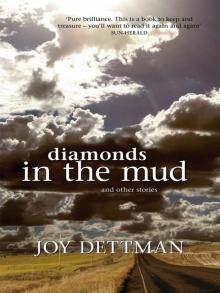 Diamonds in the Mud and Other Stories
Diamonds in the Mud and Other Stories Moth to the Flame
Moth to the Flame The Tying of Threads
The Tying of Threads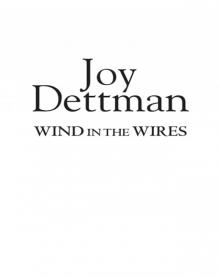 Wind in the Wires
Wind in the Wires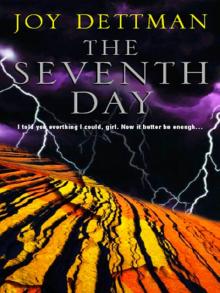 The Seventh Day
The Seventh Day Thorn on the Rose
Thorn on the Rose Jacaranda Blue
Jacaranda Blue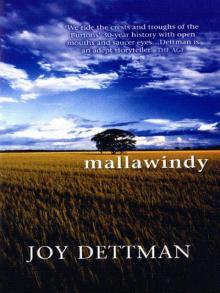 Mallawindy
Mallawindy Ripples on a Pond
Ripples on a Pond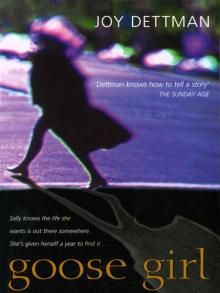 Goose Girl
Goose Girl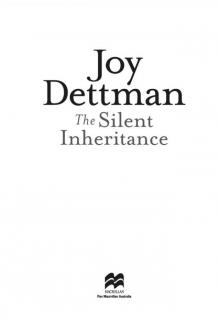 The Silent Inheritance
The Silent Inheritance Henry’s Daughter
Henry’s Daughter Yesterday's Dust
Yesterday's Dust Pearl in a Cage
Pearl in a Cage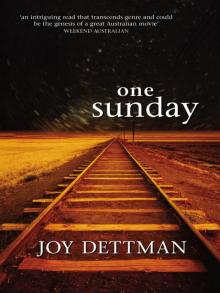 One Sunday
One Sunday